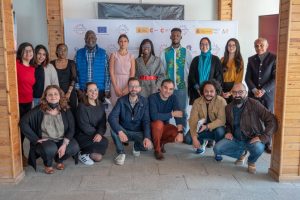
06/10/2022
The European project has focused especially on women, who are most affected by racial discrimination
The project “Living together without discrimination: a human rights and gender-based approach” ends after five years of work between Spanish cooperation and Moroccan institutions, with funding from the European Union, to support the development of public policies to prevent and combat racism and xenophobia in Morocco, paying particular attention to gender inequalities.
The project was launched in August 2017 with funding from the European Union and through a consortium between the Spanish Agency for International Development Cooperation (AECID), the FIIAPP and the Spanish Observatory on Racism and Xenophobia (OBERAXE) under the State Secretariat for Migration (SEM) of the Ministry of Inclusion, Social Security and Migration. On the Moroccan side, the project partners were the National Council for Human Rights (CNDH) and the former Delegate Ministry of the Ministry of Foreign Affairs, African Cooperation and Moroccans Living Abroad (MDCMRE).
 In addition to the signatory institutions, the project has involved the efforts of a significant number of national and regional institutions, which have actively participated in the implementation and monitoring of the actions. Civil society and the media have also played an important role. All the actors involved in the intervention underlined the relevance of the work carried out and the achievements made in terms of stimulating a debate that is at the heart of the promotion of human rights and social development in the country.
In addition to the signatory institutions, the project has involved the efforts of a significant number of national and regional institutions, which have actively participated in the implementation and monitoring of the actions. Civil society and the media have also played an important role. All the actors involved in the intervention underlined the relevance of the work carried out and the achievements made in terms of stimulating a debate that is at the heart of the promotion of human rights and social development in the country.
The project has contributed to opening up the debate on racism and xenophobia towards the migrant population in Morocco, which until then had not been openly addressed at the institutional level, and the ways to tackle, prevent and eradicate it by facilitating the creation of dialogue and content on the issue in Morocco, which until now had been largely invisible. The project has also focused on the intersectionality of discriminations (gender inequalities and discrimination based on racial or ethnic origin), which specifically affect migrant women.
Thanks to the work carried out, legal tools have been developed to identify needs for legislative improvement in Morocco and specific recommendations for the improvement of public policies. Recommendations to improve the coordination of existing complaints mechanisms in order to increase the detection, identification and investigation of racist and xenophobic incidents, as well as their subsequent follow-up.
A total of 30 trainers from five public institutions (Higher Institute of the Magistracy, Institution of the Mediator, Governor and Council of the Eastern Region, Ministry of Health and Ministry of Education) are now prepared to train other public agents from these same institutions, which have citizen services, in the prevention and fight against racism and xenophobia.
More than 300 students from 7 schools have had the opportunity to participate in projects to promote coexistence in their structures. The support provided to the educational teams of these schools and the education academies in the regions of Tangier and Casablanca will enable the continuation of this pilot project, which has been integrated into the educational life of the schools on a permanent basis.
More than 100 civil society organisations have participated in virtual and face-to-face meetings on racism, xenophobia and racial discrimination and more than 200 people from these organisations have been trained in the 15 training courses organised by the project. Work has also been carried out with associations made up of migrants in Rabat and Agadir to raise awareness among the population.
A group of 10 media professionals have accompanied the reflection on the ethical principles necessary in communication, in order to deal with the migration phenomenon in a way that can prevent racism and xenophobia. This reflection has materialised in the production of a collective web documentary available on the project’s website.
To give visibility to these actions, the project has made nine publications available to interested parties, accessible through the project’s and partners’ websites, in several languages: Arabic, French, Spanish and English. Numerous communication products have also been disseminated in Arabic and French to raise public awareness and to support the educational activities organised. All these videos and guides are available on the project’s website and social networks.
The project is thus coming to an end, but the exchanges that have been built around it continue thanks to the commitment of the institutions, organisations and individuals who have accompanied this process over the years. The project is coming to an end, but the message will continue to attract new actors involved in promoting coexistence without discrimination and an inclusive, diverse, egalitarian and fair society.



